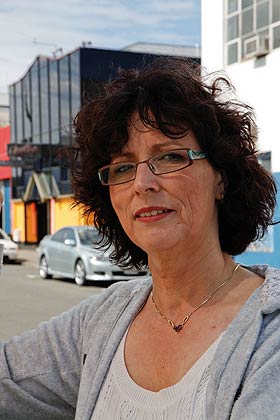

Dr Gillian Abel
There is compelling evidence that decriminalisation achieved the aim of addressing sex workers' human rights and had a positive effect on their health and safety.
New Zealand has always been a leading light in championing women's rights. So, not surprisingly, it was the first country to decriminalise prostitution in an attempt to improve sex workers' health and safety.
Senior public health lecturer Dr Gillian Abel's PhD thesis investigated whether decriminalisation of the sex industry had achieved this objective.
In partnership with the New Zealand Prostitutes' Collective, Abel surveyed 772 sex workers from Auckland, Christchurch, Wellington, Nelson and the Hawkes Bay, and did in-depth interviews with 58 of them.
The result was the book Taking the Crime Out of Sex Work: New Zealand sex workers' fight for decriminalisation which details the history of sex work in New Zealand, industry regulation, what led to decriminalisation, and its impact on health and safety practices.
Abel says the book provides compelling evidence that decriminalisation achieved the aim of addressing sex workers' human rights and had a positive effect on their health and safety.
Decriminalisation has provided sex workers with more tools to manage their work environment. With knowledge of their employment rights, brothel workers are better able to assert their rights with operators and clients, she says. The relationship between sex workers and police has also improved, the book shows.
However, there is still stigma associated with the job and, Abel says, there is still work to be done in improving the health and safety of particular groups in the industry, especially migrant workers.
Government social policies need to be improved to protect those aged under 18 entering the sex industry, such as freeing up access to the independent youth benefit. Likewise, greater support is needed for transgender youth, who are particularly vulnerable to being drawn into the industry.
Abel says the world was watching when New Zealand passed legislation to decriminalise sex work seven years ago. This international scrutiny was one of the reasons Abel and her coauthors Lisa Fitzgerald (a former University of Otago, Christchurch, health promotion lecturer) and Catherine Healy (of the New Zealand Prostitutes' Collective) decided to write the book.
She explains that in some other countries, such as the Netherlands, sex work is legalised in a way that groups such as street workers and those operating from home are not protected by law. In other countries, such as the UK, activities associated with sex work are still criminalised and sex workers in these countries are vulnerable to exploitation, coercion and violence.
Funding
- Health Research Council
- Ministry of Justice